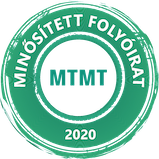A tulajdonságra utaló családnevek kognitív nyelvészeti megközelítésben
Absztrakt
Family names referring to personal characteristics, discussed in the framework of Cognitive Linguistics
The present paper adopts a Cognitive Linguistic approach to examine the name-giving situation and to enumerate the domains (e.g. place of residence, occupation, personal characteristics) from which the namers can choose. The strongest emphasis is on family names referring to personal characteristics; the author, using the terms of Cognitive Linguistics, differentiates between name objects and name relations. In the course of name-giving, the namers, focusing on a characteristic of the individual, name the object (e.g. a part of the body) based on some of its relations (e.g. colour, size). The possible combinations of the two components are illustrated in a chart in the paper. The primary sources for the paper are Miklós Kázmér’s ‘Régi magyar családnevek szótára [Dictionary of Old Hungarian Family Names]’ and János N. Fodor’s ‘A Felső-Tisza-vidék késő középkori személyneveinek szótára (1401–1526) [Dictionary of Personal Names from the Late Middle Ages in the Upper Tisza Region (1401–1526)]’.




